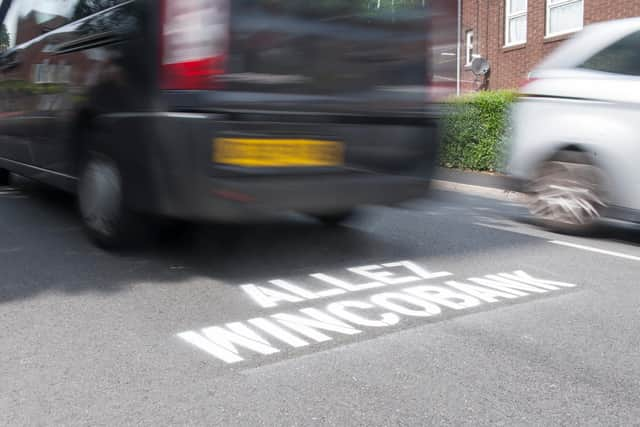What's wrong with saying ‘Can I get you something, luv?’
and live on Freeview channel 276
His common term of endearment to us and the other travellers was a word which would be used here in the UK as a derogatory term to describe a person of uncertain parentage or illegitimacy, but usual enough in his country.
As he was visiting Britain on the next leg of his holiday, we suggested that it could be a good idea not to use the term here as it could cause offence.
Advertisement
Hide AdAdvertisement
Hide AdHe was amazed. What terms of endearment do you use, then? he asked.


Possibly better to call people ‘love’ or ‘duck’ we said. Being a very macho outback type, he was gobsmacked.
Do you call men ‘love’? he said in amazement.
Of course here in Sheffield we are used to what is a classic term of affection in the North and so we were suitably indignant when guidance was given to volunteers at the last Tour de France which attracted visitors from all over the world.
Using terms like ‘luv’ was banned in case they offended visitors, in common with words like mate, duck or darling!
Advertisement
Hide AdAdvertisement
Hide AdIt seems that, although Yorkshire is well known for its warm welcome, they didn’t want volunteers using language that could cause confusion for overseas visitors.
I’m sorry but what a load of bilge! Surely language and dialect are all part of the rich culture of the British Isles. Not to be confused with bad grammar.
There would be almost no part of Britain that the Tour de France could travel through that would be immune from local terminology and if it were going through Newcastle, they would hear people called ‘pet’.
Now that could confuse and perhaps they should watch an episode of Vera first!
Advertisement
Hide AdAdvertisement
Hide AdIn the run-up to the Olympic Games held in London in 2012, one hotel chain produced a leaflet to help Olympic tourists understand a variety of accents and expressions from urban London slang to Scottish colloquialisms.
Included were expressions used in other parts of the country to describe a cup of tea.
In London, Rosie Lee, in Liverpool cup of char, in Birmingham, kippertae and in Manchester, scoobydoo. Although I tend to think that many of those might even be a bit foreign to the inhabitants of those cities!
Included was ‘dead chuffed’ for pleased, and ‘eyup’ for hello. However, the last time I heard that one was at a Bobby Knutt pantomime!
Advertisement
Hide AdAdvertisement
Hide AdA few years ago a man in the dock at a local magistrates’ court was reprimanded when he replied “Yes, luv” to a question from the judge who said it was disrespectful to use the term in a court of law and it exemplified the erosion of common decency in Britain! Sorry?
A spokesperson from the Yorkshire Dialect Society said that the judge was being discriminatory in insisting on standard English usage over traditional Yorkshire dialect, which was English spoken since Anglo Saxon times with ‘luv’ being a non-sexual term which is used by people of both genders as a term of endearment and natural for people from this area.
In Sheffield, the word ‘luv’ is used without thinking.
You might, at one time!, bump into someone in the street and say “Sorry, luv” and a waitress in a restaurant could say: “What can I get you, luv?”
It’s a word used here and part of who we are!
Advertisement
Hide AdAdvertisement
Hide AdOther parts of the country use words like ‘hun’, ‘hen’ or ‘cockle’ with ‘babe’ being an expression of modern times with the younger generation, whereas luvvies in the thespian world often traditionally call everyone ‘darling’.
In Grimsby there had even been sessions at the town’s central library, giving free instruction on old-fashioned expressions in danger of dying out in the area.
It seems that, with so many migrants having come into the area over the past few years from Eastern Europe to help with much-needed agricultural work, many words from their native languages were being absorbed into the local dialect and eventually many local expressions may die out.
Indeed, many of the younger generation from Lincolnshire are not familiar with words like ‘gingham’ to mean umbrella, mizzling to mean rain and ‘kilter and rammel’ to mean rubbish, although ‘rammel’ in that context is also a word used here in South Yorkshire.
Advertisement
Hide AdAdvertisement
Hide AdThe advice given by the organisers of the Tour de France came in for some criticism from professional Yorkshiremen like Michael Parkinson who said that it was a load of twaddle and that steelworkers of yesteryear had called each other ‘luv’ for generations, and they were the epitome of ‘real men!’
So, when the world rights itself and we find ourselves at the side of the road once more cheering on the Tour de France riders, let’s shout as one – ‘Come on, luv!’
In these confusing and worrying times, local journalism is more vital than ever. Thanks to everyone who helps us ask the questions that matter by taking out a digital subscription or buying a paper. We stand together. Nancy Fielder, editor.